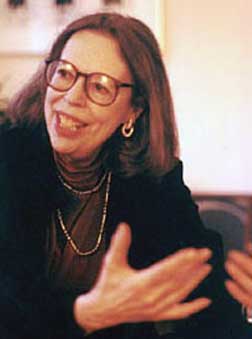Obituary
History storytelling loses key advocate, Judy Crichton, 77
Originally published in Current, Oct. 22, 2007
By Steve Behrens
Judy Crichton, the founding executive producer of American Experience, died Oct. 14 at age 77. She succumbed to complications of leukemia.
 Crichton was hired to start the series at Boston’s WGBH in 1987 and remained e.p. until 1996, serving up a prize-winning variety of history storytelling, ranging from big-event accounts and White House bios to personal narratives of individual lives. She retired as executive producer in 1996 and was awarded the National Humanities Medal in 2000.
Crichton was hired to start the series at Boston’s WGBH in 1987 and remained e.p. until 1996, serving up a prize-winning variety of history storytelling, ranging from big-event accounts and White House bios to personal narratives of individual lives. She retired as executive producer in 1996 and was awarded the National Humanities Medal in 2000.
Before coming to public TV, Crichton had broken into the all-male world of network documentaries and propelled The Defense of the United States and other major docs for commercial nets. She started at CBS Reports in 1974 and moved to ABC’s Closeup in 1982.
She worked on CBS docs that introduced the public to the existence of South Africa’s African National Congress as well as carcinogens (they can’t be removed from water by boiling), and reported on the CIA’s attempt to overthrow Fidel Castro.
Crichton grew up in TV news, helping her father, Ben Feiner, prepare the chalkboards for coverage of the 1944 elections, but she did not sail effortlessly into a good TV job. She ran away from college in her freshman year to join a newspaper as a clerk.
When Crichton finally got into TV, she spent some 17 years as an associate producer, including years at the game show I’ve Got a Secret, where she handled animal as well as human acts and learned the discipline required by live broadcasts, she told Current in 1997.
The unlikely apprenticeship gave her skills that she later used in making major docs—skills such as recognizing and retelling a good story. “Are people going to enjoy a story about a woman who has 21 children backstage?” she asked. “Well, damn right.” Crichton preinter-viewed game-show guests and figured out how to write the questions that would let the host draw out their stories most effectively.
Serious journalistic jobs had been for men only, but women were suing for admittance, and she got a job with CBS when she pointedly asked for it in 1974. “I was, if you will, an affirmative-action baby,” Crichton said in a Current Q&A. The network gave her two weeks to propose a CBS Reports story, according to the New York Times, and that story idea led to the series on carcinogens.
Crichton recognized that producers need long apprenticeships to make a good history doc, and she became a mentor to many.
Margaret Drain, who succeeded Crichton at AmEx and is now national production chief at WGBH, counts herself among the producers Crichton mentored. Drain called her “a world-class film doctor.”
Crichton also taught Chana Gazit, who worked with her and David Grubin on the AmEx about Franklin and Eleanor Roosevelt.
“She sent a whole new generation out into the world with a really sophisticated way of thinking about making documentaries,” Gazit told Current last week. “I still hear her in my head whenever I sit down and write a script.”
Among other things, Gazit says, Crichton showed her “how to unfold the information over time and how to use dramatic structures in order for that to register.”
Stories are the way viewers absorb information from TV, said Drain. “The key is if you capture their interest so the audience is anxious to learn what happens next.”
After retirement, Crichton wrote a book, America 1900, which Grubin adapted for AmEx, and she continued to consult with filmmakers, Drain said.
Crichton was survived by two daughters, a son, a sister and five grandchildren. Her husband, author Robert Crichton, died in 1993.
Web page posted Feb. 6, 2008
Copyright 2007 by Current Publishing Committee